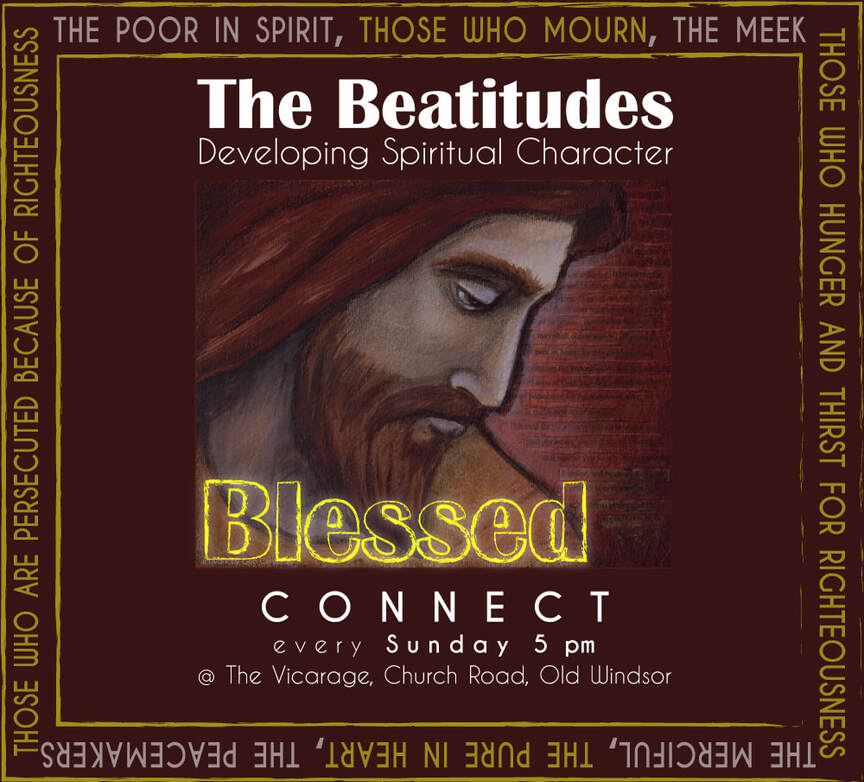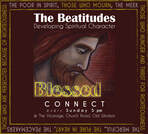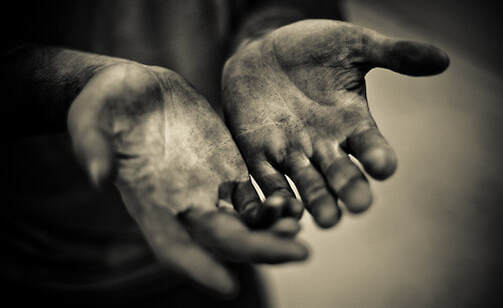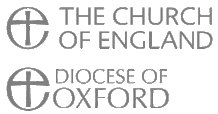Contrary to popular opinion, BLESSED (makarios) does not mean “happy,” even though some translations have put it this way. Happiness is a SUBJECTIVE state, a feeling. But Jesus is not declaring how people feel; rather, he is making an objective statement about WHAT GOD THINKS OF THEM.
Blessed is a positive judgment by God on the individual that means “TO BE APPROVED” or “TO FIND APPROVAL.” So, when God blesses us, he approves us. Blessedness indicates THE SMILE OF GOD or , THE APPLAUSE OF HEAVEN.
If you were writing beatitudes in the light of Jesus and the kingdom, who would you put in the list? Think out a set of beatitudes that would proclaim the gospel according to you. Who would you put first in the list? (Dallas Willard)
“Blessed are the spiritual zeros—the spiritually bankrupt, deprived and deficient, the spiritual beggars, those without a wisp of ‘religion’—when the kingdom of the heavens comes upon them.”
Or, “Blessed are the poor in spirit, for theirs is the kingdom of the heavens.” This, of course, is the more traditional and literally correct translation of Matt. 5:3. The poor in spirit are blessed as a result of the kingdom of God being available to them in their spiritual poverty. But today the words “poor in spirit” no longer convey the sense of spiritual destitution that they were originally meant to bear. Amazingly, they have come to refer to a praiseworthy condition. So, as a corrective, I have paraphrased the verse as above. No doubt Jesus had many exhibits from this category in the crowd around him. Most, if not all, of the Twelve Apostles were of this type, as are many now reading these words.
___________________________________________________________________________
He only who is reduced to nothing in himself, and relies on the mercy of God,
is poor in spirit. (JOHN CALVIN)
Someday, if history is allowed to continue, a perceptive artist may sculpt a statue of twentieth-century man with his arms wrapped around himself in loving embrace, kissing his image in a mirror.
We admitted we were powerless over our addictions and compulsive behaviours, that our lives had become unmanageable. (the first step of the 12 steps)
It is the imperial ego that has to go, and only powerlessness can do the job correctly…Otherwise, we try to engineer our own transformation by our own rules and by our own power, which is by definition, therefore, not transformation! It seems we can in no way engineer or steer our own conversion. If we try to change our ego with the help of our ego, we only have a better-disguised ego!
As many teachers of the Twelve Steps have said, the first Step is probably the hardest, the most denied, and the most avoided. So the whole process never takes off! No one likes to die to who they think they are. Their “false self” is all they have…Letting go is not in anybody’s program for happiness, and yet all mature spirituality, in one sense or another, is about letting go and unlearning. (Breathing Under Water – R. Rohr)
___________________________________________________________________________
Our first step in the journey of healing and wholeness is a big one. We are finally ready to admit that we are powerless to control an addiction or a behaviour. The harder we try, the more unmanageable it becomes. Our lives have descended into chaos. When we take that first big step—giving up control—we are stepping away from denial and acknowledging our own need.
There is hope in that first step, for we can’t be helped until we admit that we need help. Until then we are trying to be God in our own lives, and really, we just aren’t up to the task. We are powerless to control much of anything by our own power. Step 1 allows us to find freedom from ourselves.
(Celebrate Recovery – Daily Devotional – J. Baker)
___________________________________________________________________________
Right at the beginning of his Sermon on the Mount, Jesus contradicted all human judgments and all nationalistic expectations of the kingdom of God. The kingdom is given to the poor in spirit, not the rich; the feeble, not the mighty; to little children humble enough to accept it, not to soldiers who boast that they can obtain it by their own prowess.
(John Stott)
How does Jesus' statement in verse 3 contradict our usual idea of blessedness?
What do you think it means to be "poor in spirit"?
In what senses do we miss God's kingdom if we do not acknowledge
our spiritual poverty?
Summary:
To be "poor in spirit" is to acknowledge our spiritual bankruptcy before God. The "poor man" in the Old Testament is one who is both afflicted and unable to save himself, and who therefore looks to God for salvation, while recognizing that he has no claim upon God. Perhaps the best example of the way riches can keep us from crying out to God is the nominal church of Laodicea to whom John was directed to send a letter from the glorified Christ. Read Revelation 3: 17-22 for John's assessment of Laodicea...
The indispensable condition of receiving the kingdom of God is to acknowledge our spiritual poverty. To the poor in spirit, and only to the poor in spirit, the kingdom of God is given. For God's rule which brings salvation is a gift as absolutely free as it is utterly undeserved. (John Stott)
___________________________________________________________________________
let us look at it in relation to the virtues of FAITH, HOPE, AND CHARITY. They are the heart of the Christian life. They create in us all of God’s riches, and yet a certain mystery of poverty attaches to their exercise.
1. FAITH presupposes poverty of a certain kind. To believe means accepting that we don’t always see and don’t always understand, walking often in darkness. It means making progress by relying on another, handing oneself over to a truth that surpasses us which we don’t totally understand. It means obedience of a sort, basing our lives on the words of others, dispossessing ourselves. Abraham, our father in the faith, set out not knowing his destination.
2. HOPE is also a form of poverty. To hope means not to possess, but waiting in trust for what we don’t yet possess, as Paul says in his letter to the Romans: “For in this hope we were saved. Now hope that is seen is not hope. For who hopes for what he sees? But if we hope for what we do not see, we wait for it with patience.”
3. LOVE, too, presupposes a certain interior poverty. To love means to live not for oneself but for the other. Deciding to love someone means
consenting to dependence, renouncing self-sufficiency. True love requires renunciation of all domination, all power over the other, all possessiveness, and obliges us to respect the freedom of the other.
(Jacques Philippe)
___________________________________________________________________________
“Poor in spirit” means an inner emptiness and humility, a beginner’s mind, and to live without a need for personal righteousness or reputation. It is the “powerlessness” of Alcoholics Anonymous’ First Step. The Greek word Matthew uses for “poor” is ptochoi, which literally means, “the very empty ones, those who are crouching.” They are the bent-over beggars, the little nobodies of this world who have nothing left, who aren’t self-preoccupied or full of themselves in any way. Jesus is saying: “Happy are you, you’re the freest of all.”
(R. Rohr)
Consider what the Beatitude does not mean. It does not mean that the poor in spirit will someday later, after they die, receive a reward, a blessing. Rather, you are blessed today when you seek to be doing God’s will and following God’s way of love and forgiveness. If you feel like your spirit is not strong enough, good enough, deep enough or rich enough, then you recognize your need for God’s help. You own up to your spiritual poverty. When you turn to God, you are blessed.
(John Zehring)



